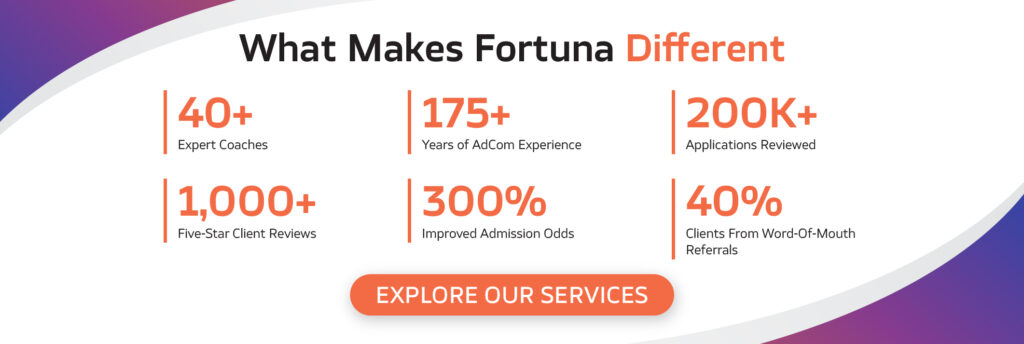An MBA elevator pitch is a 30–60 second answer to the question “So, tell me about yourself.” It should introduce who you are, what you care about, and why you’re pursuing an MBA — in a way that feels natural, confident, and memorable. Prepare by clarifying your goals for the conversation, then tailor your pitch to your audience. Keep it concise and conversational, focus on your professional presence as well as your content, and finish with a simple hook or question that invites the other person to continue the conversation.
You’ll need to introduce yourself repeatedly throughout the MBA journey — from a networking chat to an MBA interview to (hopefully) your first day on campus in the program of your dreams. You’ll want to feel confident and ready to enter any scenario. Given that building relationships, gathering insights, and understanding program culture are essential parts of getting into and thriving in an MBA program, the way you introduce yourself matters.
Top Tips To Create A Strong MBA Elevator Pitch
At its core, your MBA elevator pitch is an expression of your personal brand. It communicates the qualities, strengths, and values you want others — including students, alumni, and admissions officers — to associate with you. In those first few moments, you’re giving your listener a reason to remember you and a glimpse of the story you’ll be telling throughout your application.
I’ve been on the receiving end of a lot of pitch statements – from my career in admissions and student affairs at Berkeley Haas and Carnegie Mellon Tepper to my coaching role at Fortuna Admissions. Here are my eight tips to developing your personal MBA elevator pitch – along with an example pitch to get you started.
1. Don’t Wing It. Build With Intention.
Some MBA candidates think they can improvise their self-introduction — but in the moment, they either ramble or default to a dry recap of their resume. A strong MBA elevator pitch doesn’t happen by accident. It takes intention.
Start by drafting a simple, 45–60 second introduction that gives a clear, confident snapshot of who you are, what drives you, and why you’re pursuing the MBA. Think of it as the opening note of your personal brand: concise, authentic, and aligned with the larger story you’ll present across your application.
Your goal isn’t to script every word, but to build a foundation you can deliver naturally in any setting — whether you’re chatting with a student ambassador, meeting an alum in your target industry, or preparing for your MBA interview. When you take the time to craft your pitch thoughtfully, you position yourself to be memorable, focused, and ready for the conversations that matter.

2. Start With Who You Are — Not Your Entire CV.
Your elevator pitch should open with a clear sense of who you are today, not a chronological walk-through of every role you’ve held. Lead with the headline: your current role, sector, or area of focus — the professional identity that best captures where you’re positioned now.
For example: “I’m a product manager in fintech focused on expanding access to digital payments,” lands far more effectively than listing every job since college. Your goal is to give a quick, confident snapshot — something that establishes credibility without overwhelming with detail.
3. Connect Your Trajectory To What Motivates You.
An effective MBA elevator pitch doesn’t just say what you’ve done — it gives a glimpse into why. Think of this as the bridge between your professional identity and the deeper motivation behind your choices. What problem excites you? What impact are you trying to create? What keeps you engaged in your work?
This isn’t a full career narrative; it’s a quick spark of passion that helps your listener understand the thread running through your experiences. Admissions teams and alumni respond to purpose, not chronology.
4. Show Where You’re Headed Next.
Your elevator pitch should give a quick, confident sense of where you’re going — not just where you’ve been. In one or two sentences, articulate your career goals and why you need the MBA to achieve them. This isn’t the moment for a detailed roadmap; it’s the hinge that connects your past experiences to your future direction.
Clear intent signals maturity and preparation. Whether you’re exploring a pivot into product management, aiming to deepen your impact in sustainability, or planning to scale your influence in finance, naming your direction helps your listener understand the purpose behind your MBA.
Keep it focused, forward-looking, and authentic. You’re inviting your audience to envision your next chapter — and how the MBA fits into that arc.
5. Clarify Your Goal And Tailor Your Pitch.
Your core story should stay consistent, but the way you frame it should shift depending on who’s sitting across from you. A great MBA elevator pitch starts with intention, so ask yourself, what do you want to get out of this conversation? Are you hoping to learn about a program’s culture or understand a specific career path?
Once you know your purpose, tailoring becomes natural. With a current student, highlight program fit — what you’re curious about academically, how you hope to engage with the community, and what you’d love to learn from their experience. With an alum in your target industry, lean into the elements of your background and career goals that connect directly to their world. With someone from admissions, emphasize leadership, impact, and alignment with the school’s values.
The idea is to adapt your emphasis, not your identity. Your pitch should feel like the same story told at the right angle for the right audience — and shaped by what you’re hoping to learn or accomplish in that moment.

6. Convey Presence: How You Speak Matters As Much As What You Say.
A strong MBA elevator pitch isn’t just about content — it’s about the impression you create. Presence communicates credibility before your listener has processed a single detail of your story.
Aim for a tone that’s warm, conversational, and natural rather than memorized. Your body language, eye contact, and energy matter, too. As I often remind clients, people remember how you make them feel more than the exact words you use.
And presence applies just as much in virtual settings: your pacing, posture, and clarity on Zoom or at a virtual info session will be noticed. A steady tone, an easy smile, and genuine curiosity go a long way. Think of your delivery as part of your personal brand — the nonverbal signals that reinforce the strength of your message.
7. Leave Them Wanting More.
Your goal with your elevator pitch is to spark curiosity. The strongest pitches give a clear, confident snapshot of who you are while leaving space for the listener to ask questions.
Think in terms of the top two or three things you want someone to walk away remembering about your background and career goals. Your elevator pitch is a teaser that should open a door, not stun them into silence! Don’t be afraid to sprinkle in an interesting anecdote or thoughtful insight that could serve as a conversational segue.
A useful test: does your introduction naturally invite follow-up? If the person across from you wants to know more, you’ve struck the right balance. The pitch is just the beginning — the conversation that unfolds afterward is where the real connection happens.

8. Practice With Someone Who Knows What Works.
Once you’ve crafted your pitch-perfect elevator statement, practice it – with friends, colleagues, even yourself in the mirror. Solicit candid feedback from people you trust. It can be hard to know whether your elevator pitch lands the way you intend and a seasoned admissions coach can help you refine your language, tighten your message, and ensure your delivery feels confident, natural, and authentically you. Here’s an example to get you started.
MBA Elevator Pitch Example
Hi, I’m [first name]. I’m passionate about community health and finding better ways to support vulnerable populations. I studied business and biology at Penn and moved into healthcare consulting, and for the past five years I’ve also volunteered with the AIDS Healthcare Foundation. I’m now looking to pivot my career toward public health leadership, which is why I’m really interested in the Berkeley Haas MBA/MPH. Are you connected with any current students in the dual-degree program who I might speak with?
View my 6-minute video strategy session with Fortuna Director Caroline Diarte Edwards.
Let’s Get You In
At Fortuna Admissions, we’re a dream team of former admissions directors and seasoned MBA coaches from the world’s top business schools. We specialize in helping applicants craft compelling stories and maximize every part of the application process.
Book a free consultation to assess your candidacy and find out how we can help you get into your dream MBA program.




